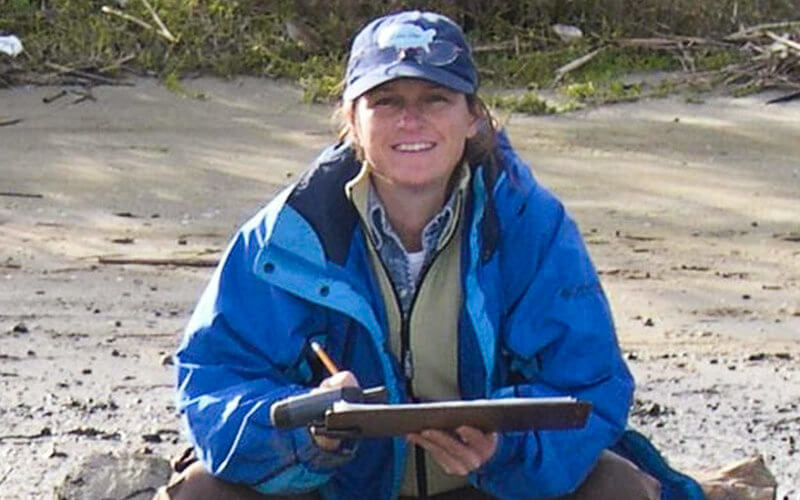
This year’s recipient of the Carol Barnes Excellence in Teaching Award is Danielle Zacherl, professor of biological science.
Perhaps Zacherl’s approach to teaching can be found in the words of one of her favorite quotes by Mary Catherine Bateson, a well-known anthropologist and author: “Worlds can be found by a child and an adult bending down and looking together under the grass stems or at the skittering crabs in a tidal pool.”
“That quote on the ‘scholarly inquiry’ aspect affects me in an extremely personal way,” said Zacherl. “I have always exhibited an abundant enthusiasm for the natural world that I attempt to transfer to students in my biology classes. Using active learning techniques helps promote both enthusiasm for biology and deep learning.”
Observers have noted that Zacherl’s teaching is engaging, intellectually stimulating and interactive. Her enthusiasm for field ecology captures students’ interests and propels them forward in solving problems, investigating key local marine species, and developing as scientists and independent researchers. Zacherl also is committed to building an inclusive community of scholars.
Excellence in Teaching
Zacherl teaches across the entire biology curriculum, including lower-division, upper-division and graduate courses. Her student opinion questionnaire scores are exceptionally high.
In her “Think Like Einstein” class, a course for first-year science and mathematics majors, Zacherl leads discussions on logical fallacies and the difference between correlation and causation. She engages with each student individually, often asking for clarification, providing follow-up information and thanking them for their contributions.
“Students felt comfortable contributing, took risks in their answers and were not afraid to be wrong,” said William Hoese, professor of biological science. “This sort of collaborative intellectual community is the norm in Danielle’s classes and was particularly impressive with this group of freshmen.
“Students describe themselves as partners in learning, which promotes individual responsibility and fosters scientific identity,” he added.
One particularly effective approach to building a classroom community involves using an activity called the “fishbowl.”
As part of the fishbowl activity, every student reads the paper and comes prepared to discuss it, but a subset of the class is randomly selected to be in the fishbowl. This group of about six students sits in the middle of the room and exclusively discusses the paper amongst themselves, with the rest of the class listening. After a period of time, the entire class is invited to join in the discussion and students jump in with their contributions.
“The fishbowl technique is incredibly effective in generating high-level discussions within the group and it also promotes participation across the entire class,” said Hoese. “I have observed students who are ‘out of the fishbowl’ literally bouncing in anticipation of being able to contribute to the conversation.”
Zacherl has been generous in sharing her classroom activities with faculty across the Department of Biological Science, many of whom now use the fishbowl approach to discuss scientific papers in their courses.
Learning Beyond the Classroom
Several years ago, Zacherl was part of a group that produced multiple instructional videos, called “Life in a Tidepool.” These videos provide short, scientifically based introductions to the biodiversity and natural history of local marine organisms. When the campus moved to virtual instruction last spring and trips to the rocky intertidal ecosystem were canceled, these videos about barnacles, sea stars and snails and sea urchins, grounded in the science of the rocky intertidal habitat, were instrumental in helping students in two introductory courses learn about the diverse marine life in Orange County.
Zacherl is active with the Southern California Ecosystems Research Program (SCERP), an undergraduate research-training program for students interested in ecology and environmental biology. She teaches a field-based course and uses a series of “challenge problems” to engage students in the research process. Faculty in this program pose a question to the group (with an unknown answer) and the students, along with faculty as mentors, develop a one-week research project to address the challenge problem. This requires a fresh curriculum be developed every year to align with each challenge problem. Students present the results of their challenge problem at scientific conferences and Zacherl works with them to help develop and practice delivering their presentations.
Over the past 19 years of SCERP, Zacherl’s challenge problems have been the most ambitious and rigorous in the program.
Mentoring Colleagues
Zacherl also works closely with incoming graduate teaching associates, mentoring them so that they are ready for their first experience as laboratory instructors. She takes a practical approach to promote student learning in the laboratory classroom. She also regularly serves as the coordinator for the laboratory TAs in introductory courses in organismal biology where she works closely with instructors on course material. She is particularly effective on course field trips—her broad knowledge base, clear explanations, and infectious enthusiasm help the TAs become effective field instructors too.
“Danielle is an exceptional mentor for the undergraduate and graduate students who work with her in her research laboratory,” said Hoese. “She collaborates with a large team of students who consider her an intellectual partner in their investigations. She asks students to be scientifically curious with her and this approach is particularly effective in growing independent scientists that design and run their own research projects. These projects regularly result in award-winning presentations at scientific conferences and often lead to peer reviewed publications with students as co-authors and often as primary authors.
“Danielle’s mentoring does not stop when students graduate from CSUF. Students from her lab go on to become scientists at local government agencies, graduate students in M.S. and Ph.D. programs and even start up their own environmental consulting companies,” Hoese continued. “And Danielle is there as a colleague, supporting and guiding them along the way.”